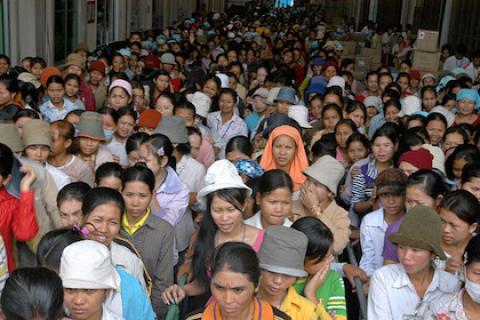Eight major clothing brands, including Swedish H&M and Spanish Inditex, which owns Zara, British New Look, and Irish Primark, have sent a letter to the Cambodian deputy prime minister saying they will pay more for goods sourced there in order to help raise pay for the country’s garment workers.
“Workers in all production countries have the right to a fair living wage,” the letter states. “As responsible Business’ [sic] our purchasing practices will enable the payment of a fair living wage.” The letter also calls on the government to establish a monitoring and policing system to ensure workers actually get any higher minimum wage to “create a competitive advantage for the factories that comply with the new minimum wage” and the installation of a yearly collective bargaining process for the workers.
The corporate support comes after at least 1,000 garment workers staged rallies in the capital last week to reinvigorate the movement for a higher minimum wage. They are calling for a raise to $177 a month from the current $100 monthly minimum wage. The demonstrations came without strikes — they were held on lunch breaks — and reportedly without violence, despite the deployment of armed troops.
The country’s garment sector is home to as many as half a million jobs and generates a third of the country’s GDP.
The lack of violence stands in contrast to protests earlier this year, when at least three people were shot and killed by police during a 300,000-person strong strike. Last year saw a record number of strikes, most to demand higher pay for garment workers, and a good deal of violence, as one person was killed in November and at least 23 were injured by police in May.
The government raised the garment industry’s minimum wage to $80 a month from $66 in May of 2013, the largest increase in more than a decade, and it raised wages again to $95 earlier this year. But wages had already dropped nearly 20 percent between 2001 and 2011. Government officials and union representatives are expected to meet in October to discuss a higher wage for garment sector workers.
Cambodia isn’t the only country sourcing clothing to the developed world to see turmoil over wages.
In Bangladesh, where a factory collapsed last year and killed more than 1,000 people, two garment workers died in clashes with police last November and 50 were injured in protests in September. In the wake of the Rana Plaza collapse, the government had promised a higher minimum wage and protections for workers seeking to unionize. Yet its 77 percent increase to $66 a month in November fell far short of workers’ call for $100 and still left the workers the worst paid in the world. Workers trying to unionize have also been met with bribery and violence. Progress in updating the safety of the country’s garment factories is slow.
The unsafe conditions and incredibly low wages are fueled by a thirst for cheap clothing among consumers in developed countries. And we are paying less: the cost of all consumer goods increased by nearly 64 percent over the last decade, but clothing prices actually fell by 3.3 percent. H&M has said it could raise its prices to help pay better wages in source countries. But it wouldn’t likely hurt our pockets too much. If companies all raised their prices to cover the cost of Bangladeshi factory upgrades, we would pay just 10 cents more per garment.
[Bryce Covert is the Economic Policy Editor for ThinkProgress. She was previously editor of the Roosevelt Institute’s Next New Deal blog. Ms. Covert is a board member of WAM!NYC, the New York Chapter of Women, Action & the Media.]


Spread the word